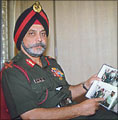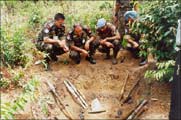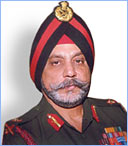Peace often comes at a terrible price -- at the price of war.
History has taught us that. In Sierra Leone we are learning that lesson all over again.
The 23 Indian peacekeepers detained by Revolutionary United Front rebels in May continue in captivity. India's Major General Vijay Kumar Jetley, who commands the UN mission in the west African nation, is fighting, besides armed insurgents, severe criticism from many quarters.
Will India call him back? Will it rethink its role in peacekeeping after its experience in Sierra Leone?
Josy Joseph spoke to Major General Ranjit Singh Nagra, VSM, the officer coordinating India's peacekeeping efforts with the UN, for answers.
General Nagra is the additional director general, staff duties, at the army headquarters in New Delhi. Excerpts from the exclusive chat:
How do you judge the Indian army's participation in the missions it has undertaken for the UN?
I would judge it at three different levels -- the international level, the national level and the professional army level. At the international level, we are part of the United Nations. All the activities of the UN, wherever it is involved, it is incumbent on our nation to take part in it. Peacekeeping happens to be one of its activities, so it is necessary that we participate in it.
At the national level, you know that we have over the last 50 years been talking for only peace. Peace as far as our nation is concerned, peace as far as our neighbouring countries are concerned, and as far as the world is concerned.
At the professional level we are most competent to take part in it because in our own country we are involved in counterinsurgency operations. Where there is law and order problem, we have been doing a very good job. Most of the problem happening as far as peace is concerned are in developing countries, which have a similar background as India. So we are very much qualified to take part in such activities.
What marks out India from the rest? What's the reason behind its active participation in peacekeeping?
I would consider this again at various levels. We have been participating in activities for the last 50 years. As far as the professional level is concerned, we have done extremely well in places like Somalia, Mozambique, Namibia and Angola. We also participated in humanitarian activities. We are doing very good service in Lebanon, helping them to construct roads, looking after their veterinary needs, the medical treatment of people. We are also taking part in de-mining activities.
As far as human rights are concerned, we are very much qualified. In Rwanda, we have done a fine job under the human rights circumstances, and that has gone down in the history of United Nations.
Another thing where we have done well is providing very fine force
commanders. Some of the names that I can recall are, General K S Thimmayya and General S P P Thorat, who worked in Korea. Then we have had General Diwan Prem Chand in Cyprus. Later he was in Namibia, where he created a fine atmosphere for holding election. Namibian government even till today is very grateful to us, and they talk a lot about him.
Then we had General P S Gyani, who was the force commander in Yemen and Gaza. General Satish Nambiar who was of course in Yugoslavia. And today we have General V K Jetley in Sierra Leone.
Among the 50,000 troops we have sent, we have sacrificed several lives for which the United Nations is very grateful to us. Ninety-one soldiers have died in these operations. And out of that, one officer, Captain G S Salaria, was given a Param Vir Chakra, which is the highest gallantry award as far as our country is concerned. So we have great achievements to our credit, and we are very proud of that.
What is the current situation in Sierra Leone?
 We have 23 of our jawans and officers detained by the RUF rebels. Their condition is good, they are safe. They are being provided food. We have radio communication with them.
We have 23 of our jawans and officers detained by the RUF rebels. Their condition is good, they are safe. They are being provided food. We have radio communication with them.
They are being looked after by the second-in-command of the battalion, that is 5/8 Gurkhas, who is also with them. But he is free to move around, he moves to Kailahun, he moves to Daru, which is the base where the battalion commander stays. He is in communication with the town leaders, the RUF leaders, the RUF rebels. So they are safe at the moment. It is a question of only a few more days. Our boys will get released. I don't find any reason as to why they should be detained more. They are quite safe and quite happy.
In the light of these adversities and unexpected dangers, is there a rethinking about India's future participation in UN peacekeeping?
When we send our troops we take into consideration various contingencies. Now the decision is taken at the highest level, right at the prime minister's level. And it filters down through various levels. It is looked into by the armed forces themselves, the ministry of defence, ministry of external affairs, then the security advisor. So everybody is involved when we send our troops. These sorts of eventualities, crisis situations are already taken into consideration.
As far as Sierra Leone is concerned, we knew it was going to be a very, very difficult situation. But the United Nations had so much faith in us that they said the first battalion to go into Sierra Leone should be Indian, because Indians are the only ones who can bring in peace to this country. That is a great honour for us. So we went there, but before going there it was very clear in our mind that this sort of situation will be encountered.
This is a challenge, and we thought we should take the challenge. We have certain contingency [plans] to meet such situations. This is not the first time that we are encountering such a situation. We had a situation like this in Somalia, we had it in Rwanda, we had it in Angola where nine hostages were taken. As a matter of fact they were at that time real hostages, and they were released later.
So this sort of situation happens. This does not mean that if one crisis takes place, we stop all our activities and say that we would not take part in peacekeeping activities again. We have to and we will be taking part in peacekeeping missions. We are quite prepared to meet such eventualities.
Major General V K Jetley, force commander in Sierra Leone, has been severely criticised by many, including UN Secretary General Kofi Annan. How would you respond to that?
 It was unfortunate that the remark was made by Kofi Annan to a woman
journalist in New York. We came to know about this and we reacted strongly. General Jetley is a highly acclaimed professional officer of the Indian army. He is a decorated officer. When he was selected by the United Nations, he went through a severe selection procedure. He was selected out of three major generals that we picked out of here, of whom two were called for interviews. He was interviewed for two days, and then he was selected and sent to Sierra Leone.
It was unfortunate that the remark was made by Kofi Annan to a woman
journalist in New York. We came to know about this and we reacted strongly. General Jetley is a highly acclaimed professional officer of the Indian army. He is a decorated officer. When he was selected by the United Nations, he went through a severe selection procedure. He was selected out of three major generals that we picked out of here, of whom two were called for interviews. He was interviewed for two days, and then he was selected and sent to Sierra Leone.
Once he went to Sierra Leone, right from day one, his competence and professionalism have been acclaimed by everybody. It was very unfortunate that this sort of statement had to be made by Kofi Annan. But later on he mended himself and clarified that he always considered General Jetley a very fine military commander who is doing an extremely competent job. Not only Kofi Annan, even the head of United Nations peacekeeping also made a statement about his professionalism and competence. Also, Kofi Annan spoke to the prime minister on the issue. A statement was made for which he has regretted. We have nothing more to add to it.
So you don't plan to recall General Jetley?
No. No way.
What are the major challenges that you face while sending out troops for peacekeeping?
The first challenge is at the professional level. When you are taking part in a peacekeeping mission, the procedure by which a soldier reacts to a situation is entirely different from how he reacts in situations in his own country against enemies. He is not going there to fight, he is going there for a mission called peacekeeping or peacemaking. He has to be reoriented.
The other challenges are that we are operating in an entirely different environment, the terrain is different, the custom is different, the people are different, their languages are different. Then we are working in an international environment, where we come across UN troops from various other countries. We train our boys before they go for all these eventualities.
CLICK FOR PART 2
'Sometimes mistakes will be made, but in Sierra Leone it is much more than a mistake'
Return to Warriors of peace
Photo credits
Major General Nagra: Sondeep Shankar
Others: Indian army
Mail us your comments


 We have 23 of our jawans and officers detained by the RUF rebels. Their condition is good, they are safe. They are being provided food. We have radio communication with them.
We have 23 of our jawans and officers detained by the RUF rebels. Their condition is good, they are safe. They are being provided food. We have radio communication with them.
 It was unfortunate that the remark was made by Kofi Annan to a woman
journalist in New York. We came to know about this and we reacted strongly. General Jetley is a highly acclaimed professional officer of the Indian army. He is a decorated officer. When he was selected by the United Nations, he went through a severe selection procedure. He was selected out of three major generals that we picked out of here, of whom two were called for interviews. He was interviewed for two days, and then he was selected and sent to Sierra Leone.
It was unfortunate that the remark was made by Kofi Annan to a woman
journalist in New York. We came to know about this and we reacted strongly. General Jetley is a highly acclaimed professional officer of the Indian army. He is a decorated officer. When he was selected by the United Nations, he went through a severe selection procedure. He was selected out of three major generals that we picked out of here, of whom two were called for interviews. He was interviewed for two days, and then he was selected and sent to Sierra Leone.